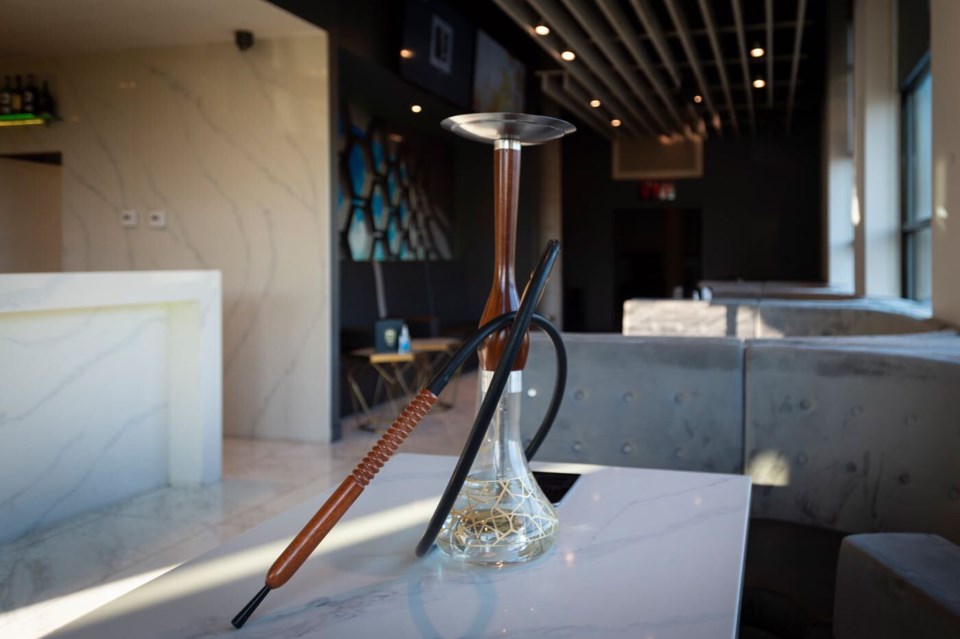Two hookah lounge business partners want their business grandfathered to allow it to continue operating as the city moves to restrict hookah smoking indoors.
Otherwise, the operators of the Living Room Lounge say they will be out on a $2-million investment into their business. Pascal Berro, an investor in the lounge, said she didn’t want to have to resort to legal action.
“Ultimately, we will close down in bankruptcy. We won’t make it,” Berro said of what will happen if a bylaw banning hookah lounges is passed.
In its Nov. 23 meeting, city council voted to give hookah bars until Jan. 1, 2022 to convert to restaurants or other types of businesses, in an effort to appease opposition to the forthcoming smoking bylaw. The 2022 deadline was an extension proposed by Coun. Pietro Calendino to a July 1, 2021 deadline recommended by city staff.
Calendino said he wanted to give the business operators more time to transition, given the limited income due to provincial restrictions from the COVID-19 pandemic.
The vote was approved with only councillors Colleen Jordan and Dan Johnston opposed, both saying they thought the city shouldn’t be going further than the province in restricting hookah smoking.
“The province has amended the smoking regulation on several occasions, and they did say smoking of hookah with tobacco was not permitted anymore,” Jordan said, noting that none of the provincial regulations has banned smoking non-tobacco hookah products.
“Why would we supplant our own view with that of the province, who is the one who regulates workplaces and is the one who sets regulations for the whole province?”
The bylaw banning smoking indoors will not allow council to grandfather existing businesses, so Jordan suggested the city ditch the bylaw and create “hookah lounge” as a type of business. Then, she said, the city can regulate how the lounges operate, including age restrictions and others, as well as how many can open.
In an interview with the NOW, Berro and Mike Munther, owner of the lounge, similarly advocated for the city to vote down the bylaw and allow their business to operate.
“The city is saying that they want us to run as a restaurant, but we’re not a restaurant,” Berro said. “I do not have a commercial kitchen. I’m not even allowed to have a commercial kitchen due to the venting. … The city allowed us to open a hookah lounge. We’ve spent so much money. We have families we’re taking care of.”
In all, Berro and Munther said they’ve invested $2 million into the business, including $200,000 for a venting system to circulate air from the outside to maintain air quality inside. Munther said he also has invested a lot into designing his own hookah pipes, using parts from around the world. Berro said the city’s response has been effectively to say “too bad.”
City council received a delegation last month from anti-smoking advocate Marilyn Bergstra, with Action on Smoking and Health, which the Living Room operators pushed back against. While Bergstra claimed countries like Jordan and Turkey have banned hookah smoking inside, which she said negated claims of cultural significance, Berro and Munther said they both have family in the Middle East, and hookah lounges are still allowed where their families are.
According to a Christian Science Monitor article, Jordan passed a law in 2008 banning hookah indoors, but the ban is rarely enforced outside Amman, the country’s capital. In Turkey, according to an Agence France-Presse article, authorities began enforcing a ban in 2013.
And while Bergstra framed the issue as a workers’ rights issue – the right to work in a smoke-free environment – Berro said their staff willingly work in the hookah lounge, and they often smoke hookah themselves.
Berro said the issue has had a significant impact on her, personally.
“We have a pandemic right now. It’s hard. It’s been very hard on us. I’ve been stressed out,” she said. “I don’t sleep. I cannot think straight. We’re dealing with so much right now, and to bring this on to us at this time is … unjust, and it’s inhumane.”
Asked whether the pair would consider a legal challenge if they aren’t accommodated, Berro said she didn’t want it to come to that.
“If we can compromise and work something out, that would save the city a lot of money, and it would save us a lot of money,” Berro said. “We don’t want to go into a legal battle and waste taxpayers’ money and our money.”


